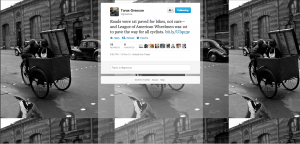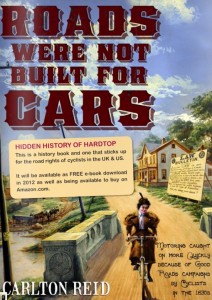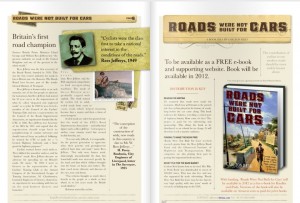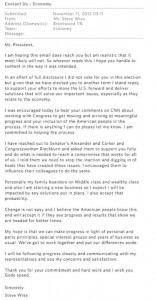Who Knew? Paved Roads Were the Result of Lobbying by Bicyclists
/2 Comments/in Bicycling, Urban Life & New York City /by Philip TurnerThis tweet by prolific travel essayist Taras Grescoe caught my eye.

 I followed the link to a website for what turns out to be a forthcoming book titled Roads Were Not Built for Cars, by Carlton Reid. At the site I found an interior spread with a cover and author info.
I followed the link to a website for what turns out to be a forthcoming book titled Roads Were Not Built for Cars, by Carlton Reid. At the site I found an interior spread with a cover and author info.
I had not really thought about it much before, but what I’ve read here reveals the author’s revisionist thesis that while Henry Ford and his ilk were eager to claim credit for the advent of paved roads in the 1920s, there had actually been a “Good Roads” movement harking as far back as the 1880s, when bicyclists began advocating for better riding surfaces. The writing and publication of the book has evidently been sponsored by bicycle makers in the UK and North America; with this underwriting it’s going to be a free, no-charge ebook download. I find what I’ve read in the spreads at the website reveals a fascinating, heretofore hidden aspect of modern transportation history–the development of decent roads not only made travel more enjoyable  for individuals in all kinds of wheeled vehicles, it also enabled farmers and tradespeople to bring their goods to more readily bring their goods to market, spurring economic growth. If you’re interested in reading more on this topic I urge you to go to the book’s website and leave your email address so you can be notified when the book is ready.
for individuals in all kinds of wheeled vehicles, it also enabled farmers and tradespeople to bring their goods to more readily bring their goods to market, spurring economic growth. If you’re interested in reading more on this topic I urge you to go to the book’s website and leave your email address so you can be notified when the book is ready.
Now that I think more about this, I’m reminded of a historical point raised in Alex Shoumatoff’s superb book, The Mountain of Names–a history of kinship that I had a chance to republish in paperback in 1995–which reported that the appearance of the bicycle in rural villages of Europe in the 19th century overnight extended the “courtship range” of male suitors to a great many more miles than had ever previously been the case. I’ve previously blogged about Shoumatoff’s book in relation to the Mormons’ practice of posthumous baptism, which the late Christopher Hitchens tartly dubbed “a crass attempt at mass identity theft from the deceased.”
A Supportive Message to the President, from a Non-Obama Voter
/0 Comments/in Personal History, Family, Friends, Education, Travels /by Philip TurnerAt President Obama’s post-election press conference today he delivered some opening remarks on the recovering economy and what he believes we should to do ramp up the pace of economic improvement. At the end of this statement, before opening the floor to questions, he read from an email sent to him at the White House after the election had been been decided last week. The writer was Steve Wise of Brentwood, TN, and the entire letter’s been posted on whitehouse.gov. As I invite you to read below, Mr. Wise did not vote for the president. However, he is supportive of him now that it’s clear he’ll be serving another term. What’s most notable is that his message is well-meant, not at all vituperative. He’s what Congressional Republicans are not. I can see why President Obama picked this message to read today, out of what I’m sure were the many thousands sent to the White House last week.
Thank you for your email, Mr. Wise, and your good heart. H/T @jearnest44 whose post of this on Twitter, retweeted by @Froomkin, was the first time I saw it.
Mitt Affirms His 47% Remarks in Pathetic 1st Stab at a Campaign Post-Mortem
/1 Comment/in Music, Bands & Radio /by Philip TurnerI’ve been blogging less about politics since the campaign ended last Tuesday, but am still keeping my eye on the news. An item crossed my path tonight that must be shared: Mitt’s first public post-mortem since his concession speech. As reported in the NY Times this evening, Romney and his campaign finance staff held a conference call with donors today. According to quoted portions, Romney attributed his defeat to President Obama having effectively won votes of lower-income voters by awarding them with “gifts.” The loser made, basically, the same argument as those gross super-pac ads being shown until last Tuesday, where an inner-city African-American woman talks excitedly about the “Obama phone” she’d supposedly been given by the federal government. His excuse for losing–to an audience of people whom he has an interest in convincing he didn’t piss their money away– was very similar to what he told donors in the 47% fundraising pitch. Interesting that he was speaking to contributors both times. The quotes are really offensive. Here are a couple chunks of it, from Ashley Parker’s story in the Times:
In a conference call on Wednesday afternoon with his national finance committee, Mr. Romney said that the president had followed the “old playbook” of wooing specific interest groups — “especially the African-American community, the Hispanic community and young people,” Mr. Romney explained — with targeted gifts and initiatives.
“In each case they were very generous in what they gave to those groups,” Mr. Romney said.
“With regards to the young people, for instance, a forgiveness of college loan interest, was a big gift,” he said. “Free contraceptives were very big with young college-aged women. And then, finally, Obamacare also made a difference for them, because as you know, anybody now 26 years of age and younger was now going to be part of their parents’ plan, and that was a big gift to young people. They turned out in large numbers, a larger share in this election even than in 2008.”
The president’s health care plan, he added, was also a useful tool in mobilizing African American and Hispanic voters. Though Mr. Romney won the white vote with 59 percent, according to exit polls, minorities coalesced around the president in overwhelming numbers — 93 percent of blacks and 71 percent of Hispanics voted to re-elect Mr. Obama.
“You can imagine for somebody making $25,000 or $30,000 or $35,000 a year, being told you’re now going to get free health care, particularly if you don’t have it, getting free health care worth, what, $10,000 per family, in perpetuity, I mean, this is huge,” he said. “Likewise with Hispanic voters, free healthcare was a big plus. But in addition with regards to Hispanic voters, the amnesty for children of illegals, the so-called Dream Act kids, was a huge plus for that voting group.”
On the tactical failures of his campaign,
“I’m very sorry that we didn’t win,” he said on the call. “I know that you expected to win, we expected to win, we were disappointed with the result, we hadn’t anticipated it, and it was very close but close doesn’t count in this business.”
He continued: “And so now we’re looking and saying, ‘O.K., what can we do going forward?’ But frankly we’re still so troubled by the past, it’s hard to put together our plans from the future.” . . .Still, Mr. Romney, ever the data-driven former consultant, offered a brief post-mortem analysis of where he and his campaign had fallen short. Last Wednesday and Thursday, he had convened informal what-went-wrong sessions in his Boston headquarters, where he and a small team of senior advisors pored over the numbers with Mr. Newhouse. And on the call, Mr. Romney also echoed a theme from the campaign trail, saying that while the Mr. Obama “made a big effort on small thing,” his message had been about ‘big issues.’
“Our campaign, in contrast, was talking about big issues for the whole country —military strategy, foreign policy, a strong economy, creating jobs and so forth,” he said. “And by the way, as you’ll hear from Neil, our strategy worked well with many people, but for those who were given a specific gift, if you will, our strategy did not work terribly well.”
You’ll note Romney indulges in the “shellshock” meme to describe his reaction to losing, with a weak claim that he, like the donors, had also believed their own polls and persuasion apparatus. He avers that like them he’s still getting over it all. On TPM there’s been a vigorous debate about whether it’s plausible that the Romney-Ryan camp was really shocked to lose last week, and is supposedly still getting over it. I have a few questions in this area: ) Could they have been so naive as to believe their own hype? 2) Should we call them true believers enclosed in a bubble they’ve stopped noticing even surrounds them? 3) Or cagey pols who want to move on from this without a taint on their reputations, having through political and moral malpractice actually misspent so many hundreds of millions? I agree with Josh Marshall that Romney and his staff would rather be associated with the former than the latter.
Not only does Mitt’s portrayal of President Obama as Gift-Bestower-in-Chief show a consistent worldview–from the 47% remarks to today–show that he really believes a majority of American voters expect ‘stuff’ from the government. Worse, though, he also degrades the ‘stuff’ given them, like they were all baubles. Healthcare, college tuition, and legal status for immigrants–these are hardly luxuries. What a selfish man, for one who has so much to believe that taxpayers and the government should be miserly with people who have so much less.
Manitoba Music Showcase at Arlene’s Grocery/Part II
/0 Comments/in Canada, Music, Bands & Radio /by Philip Turner As mentioned in my last post, ManitobaMusic.com held its annual showcase in Manhattan last night, at Arlene’s Grocery on the lower east side. It was a great night of live music, with four talented acts taking the stage–The Magnificent Sevens, JP Hoe, Chic Gamine, and Greg MacPherson–and a good crowd in the comfortable venue. Happy to share some photos I took during the showcase. Please click here to see all photos.
As mentioned in my last post, ManitobaMusic.com held its annual showcase in Manhattan last night, at Arlene’s Grocery on the lower east side. It was a great night of live music, with four talented acts taking the stage–The Magnificent Sevens, JP Hoe, Chic Gamine, and Greg MacPherson–and a good crowd in the comfortable venue. Happy to share some photos I took during the showcase. Please click here to see all photos.
Manitoba Music Showcase at NYC’s Arlene’s Grocery, Nov. 13
/1 Comment/in Canada, Music, Bands & Radio, Urban Life & New York City /by Philip Turner Tuesday night from 8-10:30 PM Arlene’s Grocery on the Lower East Side will feature a great bill with musical acts visiting NYC from the Canadian province of Manitoba. It’ll be the second year in a row that ManitobaMusic.com is hosting this showcase. Last year I had the good fortune to discover two of the acts who are returning tomorrow night, along with two new acts I’m eager to hear for the first time.
Tuesday night from 8-10:30 PM Arlene’s Grocery on the Lower East Side will feature a great bill with musical acts visiting NYC from the Canadian province of Manitoba. It’ll be the second year in a row that ManitobaMusic.com is hosting this showcase. Last year I had the good fortune to discover two of the acts who are returning tomorrow night, along with two new acts I’m eager to hear for the first time.
The two acts making return visits are Chic Gamine (pictured above) a five piece outfit composed of four female singer/instrumentalists from Winnipeg, and the lone guy, the drummer, from Montreal. With great verve and stage presence, they perform an energetic melange of anglophone, francophone, and First-Nation tinged rootsy pop. Songs like “Closer,” on video here from their website show their tremendous talent and inspired songwriting.
I love their sound, their style, their great look, and am eager to hear them and meet them once more, and their outgoing manager Jeff Horowitz, who made sure I knew about this gig.
The other artist I’m eager to hear again is singer/songwriter JP Hoe (pictured below) also from Winnipeg. A year ago he gave me a demo of his forthcoming album, “Mannequin,” with terrific songs such as “Bingo Palace” and Do I Know You?, and I’m glad to see it’s since been released and he’s been touring North America in support of it, including dates in Los Angeles, Portland, OR, and NYC, as well all over Canada.
Their are two other acts tomorrow night, The Magnificent 7s and Greg MacPherson. I’m eager to hear them too, since ManitobaMusic.com has shown themselves to be so adept at presenting great talent to New Yorkers. If you’re eager to hear some great music, I suggest you come out to Arlene’s Grocery on Stanton St. to hear these talented musicians from Manitoba. The cover is just $5. Here’s the line-up:

A Memoirist Can Go Home Again, and Not Get Shot
/0 Comments/in Books & Writing, Publishing & Bookselling /by Philip Turner A good article in the Saturday NY Times zeroes in on memoirist Domingo Martinez whose book The Boy Kings of Texas is one of five nonfiction finalists for the National Book Award, which will be handed out this Wednesday in a black tie ceremony here in New York City. Laura Tillman reports that Martinez’s book is a frank and raw portrait of his troubled young life and violent upbringing in Brownsville, TX. The dateline on the article is Brownsville, which is key, because Tillman had the opportunity be with Martinez on a recent trip he made to his hometown. Tillman writes,
A good article in the Saturday NY Times zeroes in on memoirist Domingo Martinez whose book The Boy Kings of Texas is one of five nonfiction finalists for the National Book Award, which will be handed out this Wednesday in a black tie ceremony here in New York City. Laura Tillman reports that Martinez’s book is a frank and raw portrait of his troubled young life and violent upbringing in Brownsville, TX. The dateline on the article is Brownsville, which is key, because Tillman had the opportunity be with Martinez on a recent trip he made to his hometown. Tillman writes,
“It was the first time Domingo Martinez had returned here in nearly 10 years, and it seemed as if nothing and everything had changed. His street, once rutted caliche, was now potholed pavement. Favorite stores had shuttered, but new mom-and-pops still sold tamales and tacos, and the 18-foot border fence between the United States and Mexico slashed rust brown through farmland panoramas.
Mostly, Mr. Martinez marveled at how the decade had worn on his grandmother Virginia Campos Rubio, softening that gun-slinging lioness into a slow-moving 85-year-old with a gentle smile. Ms. Rubio is one of the central characters in Mr. Martinez’s book. . . . In the book Mr. Martinez describes how an abusive, starvation-plagued childhood filled Ms. Rubio with rage, making her both loved and feared in the barrio where he grew up. She still keeps a pistol on her bed, alongside a copy of the Bible, a doll and a bag of cheese puffs.”
Martinez approached the visit with some trepidation, actually fearing possible reprisals from people he’s written about.
“’I was terrified about coming back to Texas,” Mr. Martinez said. “I was afraid that I was going to have a violent confrontation—that I’d get shot.’”
In short, not everyone is happy with the portrait he’s painted. Lecherous neighbors and abusive relatives populate the memoir’s pages. Mr. Martinez said the accounts themselves hadn’t been disputed, but that didn’t make the public airing of dirty laundry easier to bear. . . . No brawls took place on the trip. Instead Mr. Martinez was fed caldo de res, a beef-and-vegetable soup (prepared by his father) and mole with chicken and rice (prepared by his grandmother). He was applauded by more than a thousand students, visited by old teachers and given many congratulations. His immediate family supports the book, though he said it had been too painful for his parents to read. His grandmother doesn’t speak English, and Mr. Martinez said he hoped she wouldn’t be exposed to the book’s contents.”
I’m eager to read such an honest memoir, and more than happy for the author and the people involved in its publication. His literary agent is Alice Fried Martell, whom I mentioned on this blog when we both attended the Publishing People for Obama fundraiser last June. As an in-house acquiring editor I always enjoyed reading submissions from her clients. I learned from Keith Wallman, a longtime editorial colleague when we were both with Carroll & Graf, now at Lyons Press, that Alice sold the book to another editor there, Lara Asher. Lyons Press is a Connecticut house that has never before had a National Book Award nominee. There I’m friendly with publisher Janet Goldklang, who last year brought out James Kunen’s superb Diary of a Company Man: Losing a Job, Finding a Life.
The Boy Kings of Texas is nominated alongside books by fellow finalists Robert Caro, Anne Applebaum, Katherine Boo, and the late Anthony Shadid. I congratulate Mr. Martinez for the acclaim he’s receiving, and for his candor in exploring this personal terrain so movingly. I’m also happy for my publishing friends involved with such an exceptional book
Shields & Brooks, Decent to President Obama this Friday
/0 Comments/in Media, Blogging, Internet, Personal History, Family, Friends, Education, Travels /by Philip TurnerWow, for the first time in months I found the Friday night commentary of Shields & Brooks on the PBS NewsHour fair and reasonable toward President Obama. They weren’t so carping and snarky as usual.
One remarkable piece of information: Mark Shields reported that an Obama campaign staffer told him that following President Obama’s emotional remarks at Chicago campaign HQs, video of which I featured here last night, the president shook hands with and greeted all 700 staffers.


